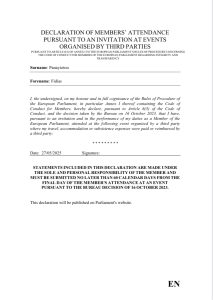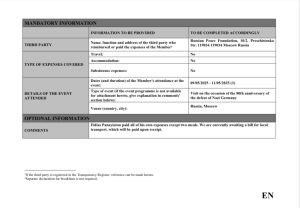On May 9, 2025, a day sacred to Putin’s propaganda, a group of five members of the European Parliament arrived in Moscow.
The group included:
Ruth Firmenich and Michael von der Schulenburg from Germany, members of the left-wing party «Sandra Wagenknecht’s Alliance.»
Ľuboš Blaha from Slovakia, a member of the ruling Smer party.
Ondřej Dostál, an independent MP from the Czech Republic.
Fidias Panayiotou, an independent member of the Republic of Cyprus.
The Russian media covered the arrival of the MEPs in detail and quoted their statements. In particular, Ruth Firmenich called the visit «a gesture against Russophobia,» while Blaha said that «Russia saved Europe from Nazism and has a right to respect.»
Cyprus MEP Fidiass Panayiotou, called Russians «brothers,» citing their shared religion and moral values with the Greeks, criticized the EU for supporting Ukraine with weapons and finances, calling it «insane and inhumane,» and called on the EU to engage in dialogue with Russia rather than military action. He also said that he was expressing the views of those who support friendship with Russia, who are in the majority in Greece and Cyprus.
The actions of these MEPs drew sharp criticism. European Parliament President Roberta Metsola condemned their visit to Moscow, calling it «undermining the EU’s position on the aggression against Ukraine.»
With regard to the German MEPs (BSW), sanctions were discussed within The Left faction, including the possible revocation of their mandates in the event of systematic violations of the EU’s foreign policy. The foreign ministries of the Czech Republic and Cyprus condemned the trips of their citizens.
The European Parliament launched an investigation into a potential violation of the code of conduct for members of parliament. The main question is who organized the trip and paid for it.
Fidiass Panayiotou vaguely stated that he visited Moscow as a private individual and paid all expenses out of his own pocket. He did not provide any documents to support these statements.
Other participants in the trip also stated that they visited Moscow «in a personal capacity» and organized the visit themselves, but did not provide any specific explanations as to who paid for the trip.
According to European Parliament rules, members are required to submit a declaration for each trip, including when the trip is declared as private and paid for personally. The declaration must be submitted within one month of the trip, indicating the source of funding and the amount of expenses covered.
On June 27, a declaration about his trip to Moscow was published on the European Parliament website in the section dedicated to MEP Fidiass Panayiotou.
German MEPs Ruth Firmenich and Michael von der Schulenburg published similar declarations on June 16 and 15, respectively. Slovak MEP Luboš Blaha has not done so yet. Apparently, he cannot make up his mind.
According to these documents, the trip to Moscow by Panayiotou, Schulenburg, Firmenich, Blaha, and Dostal was organized by the “Russian Peace Foundation”. This foundation is the successor to the “Soviet Peace Foundation” (SPF), which was established by a decision of the Council of Ministers of the USSR and the Central Committee of the Communist Party of Soviet Union in 1961. Formally, the SPF was created to promote ideas of peace, international solidarity, disarmament, and to support peace movements abroad. In reality, it served as a cover for espionage, sabotage, coups, provocation of military conflicts, support for terrorist groups, destabilization of the situation in Western countries, and the spread of communist propaganda and disinformation. The foundation acted as a legal instrument for financing Soviet agents abroad. That was why it was created. The Russian Peace Foundation continues these activities.
According to an investigation by The Insider, the foundation collects data on its foreign guests: politicians, journalists, activists, NGO representatives, and passes this information on to the Main Intelligence Directorate (GRU) of the Russian Ministry of Defense for recruitment purposes. It does so on a systematic basis. This includes the transfer of accreditation forms, questionnaires, photographs, passport copies, and additional information about these people’s business and political connections.
The visit of MEPs to Moscow in May 2025 fits perfectly into the foundation’s program of activities.
Each of the deputies attached a mandatory appendix to the declaration of the trip — a program of their visit to Moscow.
There is one small detail. The document published in the Panayiotis section is in Word format.
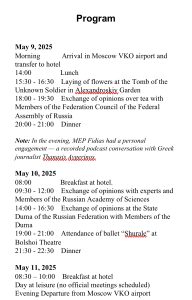
These are the attributes of this file:
tag1_tag1_last_modified_by_
value_value
PANAYIOTOU Feidias
tag1_tag1_create_date_value_value
2025:05:24 23:00:00Z
tag1_tag1_modify_date_value_value
2025:05:27
tag1_tag18_author_s_value_value
PANAYIOTOU Feidias [Feidias, PANAYIOTOU]
Other MEPs have PDF files. After examining the attributes of these files, it became clear that the Word document was created by Feidias Panayiotou on May 24 and is the original document.
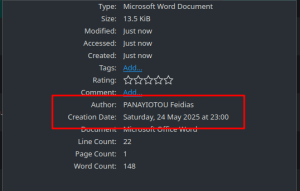
The attachments to the declarations of other MEPs, published in PDF format, are scanned copies of the original declaration created by Panayiotou in Word format.
This is what the program of German MEP Ruth Fermiñich looks like in PDF format.
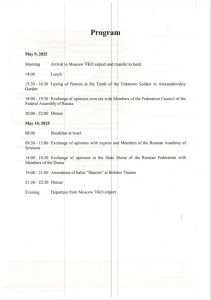

And these are the attributes of this file:
tag1_create_date_value
2025:05:24 23:00:00Z
tag1_modify_date_value
2025:05:27
tag1_creator_value
PANAYIOTOU Feidias
tag1_company_value
European Parliament
A similar pattern can be observed among other MEPs who accompanied Feidias Panayiotou on his trip to Moscow.
This suggests that Feidias Panayiotou knew the details of the Moscow visit before anyone else, shared them with other members of the group, and was therefore the organizer, forming the delegation of MEPs and coordinating their actions with Russian authorities.
A visit to Moscow on Victory Day, Russia’s main public holiday, with participation in official state ceremonies and meetings with high-ranking Russian officials, requires at least six months of preparation, if not more. It is necessary to agree on the protocol, security, organize meetings with high-ranking officials, calculate the consequences, and much more. The fact that it was Fidias Panayiotou who was entrusted by the Russian special services, represented by the Russian Peace Foundation (RPF), with organizing this demonstrative political event speaks volumes and points to his special ties with Moscow.
The program of the visit itself is also interesting. First of all, it is noteworthy that Fidias Panayiotou spent one day longer in Moscow than the other members of the delegation.
Ralf Schulenburg, Ruth Firmenich, Lubos Blaha, and Ondrej Dostal left Moscow on May 10, the day after their arrival, while Fidias Panayiotou flew out on May 11, which may indicate that he is treated differently by Russian authorities.
Judging by photographs, Fidias Panayiotou stayed at The Carlton Hotel during his visit to Moscow on May 9–11, 2025. The cost of a standard room at this hotel on a normal day is 79,000 rubles per night, and rooms with a view of Red Square, like Panayiotou’s, start at 230,000 rubles per night (approximately 2,400 euros). Given the date of the visit, May 9, the cost of the room was, of course, higher. The choice of such a luxurious hotel for a «self-financed» trip casts doubt on the veracity of Panayiotou’s claim that he paid for the trip out of his own pocket. Considering Moscow prices, he would have had to spend almost a month’s salary as an MEP (€8,000) on airfare, accommodation, meals, and transportation.
Program
May 9, 2025:
Morning
Arrival at Vnukovo Airport, Moscow, and transfer to the hotel
14:00 Lunch
15:30 – 16:30 Laying of flowers at the Tomb of the Unknown Soldier in Alexander Garden.
6:00–7:30 p.m. Meeting at the Federation Council, exchange of views over tea with members of the Federation Council of the Federal Assembly of the Russian Federation.
(The meeting was attended by Fidias Panayiotou, Ruth Firmenish, Lubos Blaha, and Ondrej Dostal. Shulenberg’s program includes a meeting with the chairman of the Russian delegation of the EU-Russia Interparliamentary Cooperation Committee. It was not possible to identify the person with whom Shulenberg met from open sources. There is also no certainty that there is such a committee/delegation in the Federation Council, unlike in the State Duma. This may be a deliberate attempt to mislead the public about his contacts.
8:00 p.m. – 9:00 p.m. Dinner.
May 10, 2025:
08:00 Breakfast at the hotel.
09:30–12:00 Exchange of views with experts and members of the Russian Academy of Sciences.
2:00 p.m. – 4:30 p.m. Exchange of views in the State Duma of the Russian Federation with members of the Duma.
7:00 p.m. – 9:00 p.m. Attendance at the ballet “Shurale” at the Bolshoi Theater
9:30 p.m. to 10:30 p.m. Dinner
(During the break between events, Fidias managed to interview Greek Russophile and Putinophile Thanasis Avgerinos, who was recruited by Russian special services on ideological grounds in the early 1990s while studying at Moscow State University.
There is nothing special here — just the usual informational events on the sidelines of the program to expand the reach of the Greek-speaking audience, which has strong sympathies for Russia).
May 11, 2025 (Panayiotou):
08:30-10:00 Breakfast at the hotel
Free day (no official meetings scheduled)
Evening departure from Vnukovo Airport, Moscow
As mentioned above, with the exception of Panayiotou, the entire group of visitors departed Moscow on the evening of May 10, after the customary ballet performance and dinner.
Fidiass left Moscow on May 11, apparently in the afternoon.
To analyze the significance and hidden meaning of the protocol events and contacts of Fidias Panayiotou, we turned to experts in Brussels with experience in diplomatic relations with Russian agencies. After studying the visit program and photos of Panayiotou, the experts provided the following conclusions:
«May 9:
Participation in the ceremony of laying flowers at the Tomb of the Unknown Soldier on May 9 is an extraordinary event for ordinary MEPs.
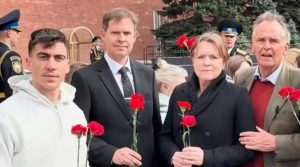
On this day, flowers are laid EXCLUSIVELY by top-level politicians: Putin and senior Russian officials, heads of state and government delegations. This does not fit in with the statement by Panayiotou and other members of the delegation that they came to Moscow in a «personal» capacity. On the contrary, it indicates a high level of protocol support from the Russian authorities, which is absolutely impossible in the case of a «personal» trip, as Panayiotou claimed. Participation in the May 9 ceremony and the meeting with State Duma Chairman Volodin indicate that the visit was organized at a high level with the participation of Russian agencies such as the Russian Foreign Ministry, the State Duma, and the RPF. This rules out the «personal» nature of the trip. Moreover, the visit was used to promote the narrative of international support for Russia, including through Panayiotou’s media opportunities. And an «exchange of views» with members of the Russian Academy of Sciences and a visit to the State Duma for the same purpose cannot be considered a personal trip by MEPs for tourist purposes.
Experts in Brussels who analyzed Fidias Panayiotou’s visit program laughed at the point about «exchanging views over tea» in the Federation Council. Most likely, this was a meeting between Moscow curators and their European agents of influence, at which they discussed ways to strengthen efforts to promote Russia’s interests in the European Parliament.
«The element of the program at the Russian Academy of Sciences is very telling. It was here that Fidias Panayiotou was ‘pumped up’ on the subject of the ‘Russian traditionalist worldview’ and other important and ‘sensitive’ aspects of Russian state ideology. This was the main element of his visit to Moscow, where he was brainwashed and initiated into the cult.
May 10:
The program does not include lunch, which is not in line with the practice and traditions of official visits to Moscow. Perhaps Panayiotou omitted this item intentionally to conceal additional events or meetings that do not correspond to the «personal» nature of his trip as stated.
The ballet «Shurale» – a demonstration of Tatar (Turkic) ballet/dance art – may have been significant for Moscow curators in assessing Panayiotou’s personality.
Holding a dinner after a cultural event on May 10 is not in line with the practice and traditions of such visits to Moscow. In Russian protocol, such visits usually include a lunch.
A one-hour dinner does not correspond to the format of the event; it should be longer or called something else. In Russian protocol practice, official dinners or receptions organized for foreign delegations usually last 2–3 hours and include toasts, speeches, and informal discussions. The shortened format may be related to the earlier departure of all members of the delegation, except Panayiotou, from the Russian Federation.
Panayiotou’s stay on May 11 is probably related to a special individual program and/or the aftermath of a «hard» drinking session. European officials who have visited Moscow on official visits say that the protocol elements related to food (except breakfast) are a severe gastronomic and alcoholic test. Russians always try to get Western guests drunk during lavish dinners. This is an old KGB tactic for gathering information, obtaining compromising material, and establishing control.
The purpose of Fidias Panayiotou’s stay in Moscow until the evening of May 11, 2025, remains a mystery.
A «free day» in Moscow with an evening departure for a foreign politician, especially during such a visit, is impossible. Most likely, this is a cover for secret meetings”.
After returning from Moscow, Fidias Panayiotou noticeably intensified his efforts to introduce Kremlin narratives into the European public consciousness through social media. His videos have always been full of theatrical techniques. Now, however, the quality of these techniques has noticeably improved, with an increased emotional component. Performing arts experts have confidently identified their clear similarity to traditional techniques of the Russian theater school, supplemented with elements of psychological manipulation. This is not surprising, given that Fidias Panayiotou’s team includes Russian-speaking specialists.
Fidias Panayiotou is a tool in the Russian special services’ long-term strategy to destabilize the European Union through ideological influence and manipulation of mass consciousness via social media. If no measures are taken to neutralize his destructive work, he is capable of causing serious damage to EU security. The question of whether the EU authorities are prepared to continue to tolerate his hostile activities remains open at this point.
In conclusion, we would like to quote the assessment of an independent Brussels-based center on the visit of Fidias Panayiotou, Member of the European Parliament from the Republic of Cyprus, to Russia:
«Based on publicly available information and analysis of media publications, the following reasonable assumptions can be made:
1. Regardless of the reasons for the cancellation of the visit to Russia by Fidias Panayiotou, Member of the European Parliament from the Republic of Cyprus, this visit can be seen as a sign of the irreversible strengthening of relations with the «brotherly Russian people.»
2. Previously, Fidiass Panayiotou, Member of the European Parliament from the Republic of Cyprus, positioned himself as an «influencer,» that is, an individual player. At this stage, the Russian side probably considers him a «team leader.»
This is indicated by a number of circumstances.
Analysis of videos (stand-up in the European Parliament building, May 7-8, 2025) that preceded the visit of a group of European MPs to Russia. At first glance, the video is rather mundane and dull, but it indicates that Fidias Panayiotou, a Member of the European Parliament from the Republic of Cyprus, was taking the first (and possibly subsequent) steps in so-called «team building» among MEPs sympathetic to Russia.
In doing so, he demonstrated quite respectable results.
This was certainly appreciated in Moscow, which was one of the reasons for staying in Russia for additional activities with specialists from the Russian Academy of Sciences, the Russian Peace Foundation, and so on.
3. The office of Fidias Panayiotou, Member of the European Parliament from the Republic of Cyprus, became a source of documents for his fellow travelers to Russia to declare their trip. This situation is highly unusual and confirms the assumption that he is considered a «team leader.»
4. Given the high level of digitalization of the European Parliament, as well as the fact that MEPs used document templates prepared by the office of MEP Fidias Panayiotou from the Republic of Cyprus after his visit to Russia, additional attention should be paid to the information and IT security of this institution.
5. At present, the MEP from the Republic of Cyprus, Fidias Panayiotou, is expected to be active in the following areas:
— continuing team building in the European Parliament;
— maximising the opportunities offered by this institution and his (current) status as a Member of the European Parliament to cause, at the very least, reputational/image damage and/or other harm to the European Union by disseminating content on social media;
— expanding the use of «Fidias» technology (manipulation, targeting, social media, etc.) in countries where elections are planned. The use and improvement of this technology is expected during the parliamentary election campaign in Cyprus on the penultimate weekend of May 2026.
So, what should be done?
Instead of sarcasm and irony regarding the activities and antics of Fidias Panayiotou, Member of the European Parliament from the Republic of Cyprus, we need direct dialogue with him on all media platforms.
From the “media-point” in the European Parliament to regional Cypriot publications/resources.
Panayiotou’s communication with journalist Caolan Robertson showed that this Cypriot member of the European Parliament is incapable of proactive and professional discussion, cannot handle emotional and psychological tension, and finds it difficult to formulate answers to direct questions and express his position based on reasonable arguments”.
Panayiotou’s ties with the «brotherly Russian people» have been strengthened to the point of becoming inseparable. Now, “experts in plain clothes” from the «Russian Academy of Sciences» and the «Russian Peace Foundation», which is linked to Russian military intelligence, can use him for their own purposes without restriction. However, the Cypriot blogger should exercise caution: his «Russian brothers» may at any moment decide that continuing to cooperate with him is no longer expedient and, over a cup of tea, treat him as they usually treat agents who have become unnecessary. The «Russian brothers» view recruited agents as expendable material and are always ready to sacrifice them for their own ends. It is especially important to avoid tea parties with State Duma deputy Andrei Lugovoi.
Fidiass Panayiotou should learn more biographical details about the champions of the «fraternal Russian world» among the members of the European Parliament, and it would be best to start by studying the fate of Jaromír Kohlíček.
Cyprus Daily News
The next article will focus on Panayiotou’s entourage and his sources of funding. Stay tuned for updates on our website.


